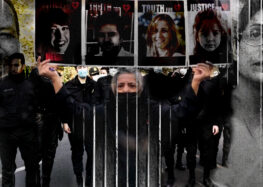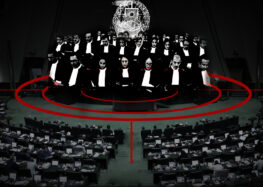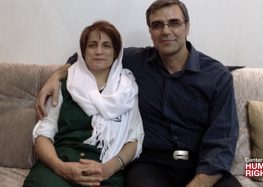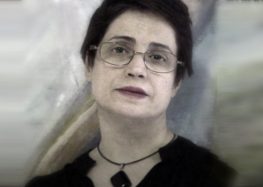CHRI Board Member Mehrangiz Kar Receives Women’s Award for Justice and Advocacy from NYC Bar Association
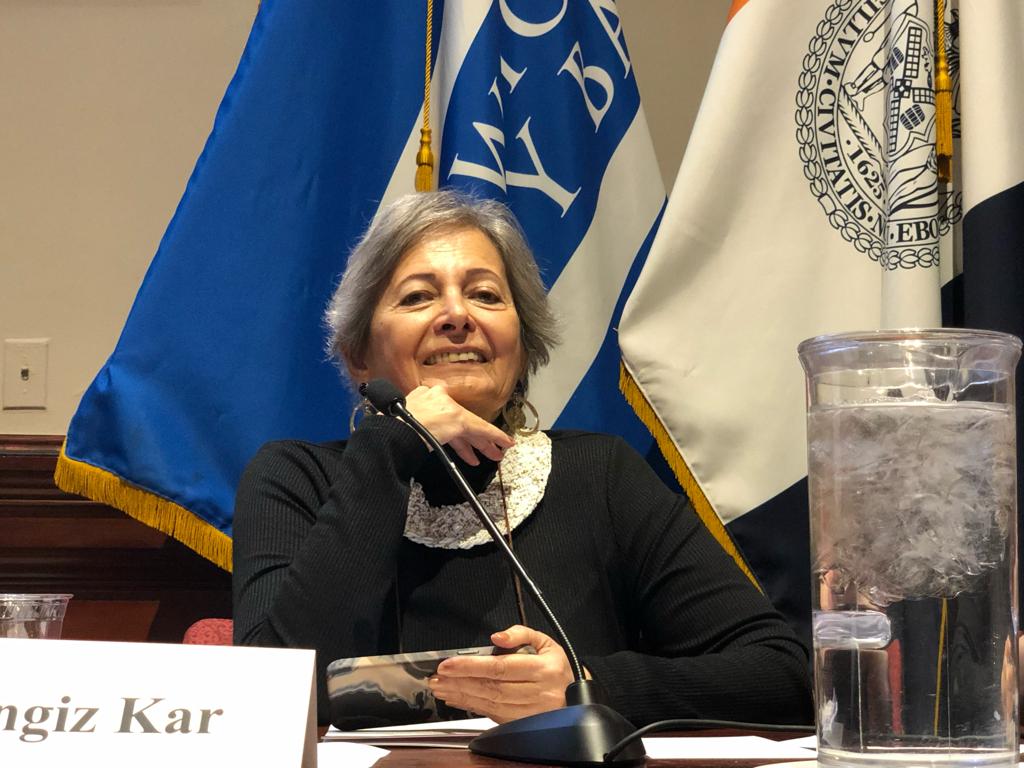
March 9, 2023 – Iranian human rights lawyer and activist Mehrangiz Kar, a board member of the Center for Human Rights in Iran (CHRI), received the Women’s Award for Justice and Advocacy from the New York City Bar Association on March 8, 2023, International Women’s Day.
“Today, on this International Day of Women, I ask the most powerful nation on earth, its citizens, and the honorable members of this profession to support Iranian women, and to specifically lend your voices to our efforts to return independence to Iranian lawyers and the Bar Association,” said Kar during her remarks at the New York City Bar Association’s 2023 International Law Conference on the Status of Women, which coincided with the 67th session of the Commission on the Status of Women at the United Nations in New York City.
Kar, who formerly practiced as a human rights attorney and defender in Iran, is also a writer who researches the promotion of democracy, rules of law, human rights, and women’s rights within the framework of Islamic law in the Islamic Republic of Iran.
Kar earned her degree in law from the University of Tehran and is a member of the bar association in Tehran, Iran. She has been a scholar at the Woodrow Wilson International Center for Scholars and a Reagan-Fascell Democracy Fellow of the National Endowment for Democracy’s International Forum for Democratic Studies.
She received the 2002 Ludovic Trarieux International Human Rights Prize, awarded jointly by the Human Rights Institute of the Bar of Bordeaux and the European Lawyers Union; the 2000 PEN/NOVIB Award of the International PEN Club in the Netherlands; and the 2000 Donna Dell’anno Award of the Conseil De Lavallee Consiglio Regionale Della Valle d’Aosta in Italy.
Following is a transcript of Kar’s speech, which she delivered as an expert panelist at the 2023 International Law Conference on the Status of Women at the New York City Bar Association on March 8.
My presence here on this day and at this gathering is especially meaningful.
Women in Iran are being subjected to extreme violence.
The state of human rights in Iran is too dire to be able to explain on a short panel.
And I would like to take this opportunity to speak about the conditions women young and old face in Iran today.
For the past 6 months, the world has witnessed the greatest uprising in history of women for women, and supported by men—a revolution led by women. The role of social media and access to means of digital communication cannot be overstated—so much so that the Islamic Republic has been shutting off internet access during the busiest times. (Iranians always find a way around it and technology companies and media helped them by setting up proxy servers to help keep their voices alive). Despite all attempts by the Islamic Republic to limit access to information, Iranians remain intrepid and use all the digital tools available to their advantage. These same digital platforms are scanned by the IRI and used to identify “anti-Islamic” content and behavior. The IRI has been unlawfully tracking and surveilling ordinary citizen’s movements and activities to better suppress protests. One of the first things the dreaded IRGC does when they arrest protestors is to take control of their social media and have them remove anti-IRI messaging. For example, Shervin Hajipour who famously won a Grammy for his song “Baraye”, which is the anthem of this revolution, was forced to remove the song from his Instagram account. This song was viewed over 40 million times in two days.
Iranian women are playing a critical role in the fight for equality and guiding the direction of this modern revolution. In the past 6 months, tens of thousands of protestors, lawyers, artists, journalists have been arrested for supporting or participating in the protests, even for sharing information about the protests on social media and other platforms. Hundreds were brutally murdered on the streets and behind prison walls—many died mysteriously within a few days of release from detention. Babies and many children are among the dead. Too many scenes of beating and death have been captured and published by citizen journalists and protestors to be able to credibly deny the atrocities being committed. The brutal torture and rape of prisoners has been well and widely documented, again in part thanks to access to digital means of sharing information.
The latest tragic escalation of violence—in the past 3 months girls schools across the country have been suspiciously targeted with toxic gas attacks. Thousands of schoolgirls have been poisoned and taken to hospital—many are in critical condition. The government is silent and has taken no action to protect or investigate these attacks. The Islamic Republic has gone further to issue an order for the arrest of any parent or person who questions or protests these attacks! Journalists who have reported on these attacks have been arrested.
This story began with the arrest of a 22-year-old woman, Zhina Mahsa Amini. Mahsa was Kurdish Iranian. She was visiting Tehran when the so-called morality police arrested her because her hair and body were not covered well enough. She was beaten and killed. The journalists that reported her death were (are) imprisoned. Mahsa’s death was the match which ignited the powder keg of this women-led revolution—women rose in large numbers and took to the streets. They set their scarves on fire and danced around those fires. Men, especially young men, rose to support their sisters in protest. The Islamic Republic immediately unleashed extreme violence on the protestors.
Violence against women, gender apartheid, persecution, oppression, segregation …began in the name of sharia and Islam from the earliest days of the 1979 revolution and was widespread in public and private life. Every generation of Iranian women in modern history has fought against discrimination. All the advancements made during the Shah’s reign, were canceled with post-revolution changes in the law. More and more limitations were placed on lawyers, preventing them from representing clients. Arrestees are routinely denied the right to select their own lawyers—they are tortured and forced to make false statements and confessions. Due process of the law has become a dream.
Today, the youngest generation of Iranian women are raising their voices to demand change. Demand a secular, non-religious government. This is the third-generation post-revolution. They have witnessed the institutionalization of discrimination against women, and their culture is at odds with the Islamic Republic which continually seeks to limit women.
It is regrettable that little attention is being paid by the most powerful governments in the world to the situation of the women in Iran. I specifically wish to address President Biden and strongly request the US government to cease attempts to negotiate with the murderous, child-killer Islamic Republic. Any engagement with the Islamic Republic will necessarily embolden them and ensure continuation of this violence against women. The world cannot continue to turn a blind eye to these atrocities.
Today, on this International Day of Women, I ask the most powerful nation on earth, its citizens, and the honorable members of this profession to support Iranian women, and to specifically lend your voices to our efforts to return independence to Iranian lawyers and the Bar Association.
I thank the City of New York Bar Association for facilitating this conversation.
Zan. Zendegi. Azardi.
Jen. Jian. Azadi.
Woman. Life. Freedom.
Mehrangiz Khanoome Kar
March 8, 2023
International Day of Women
New York, New York

